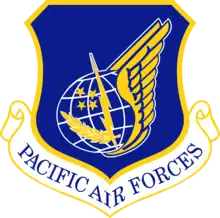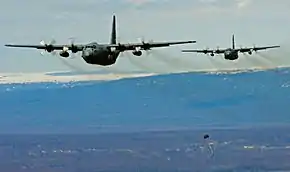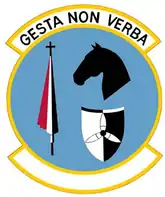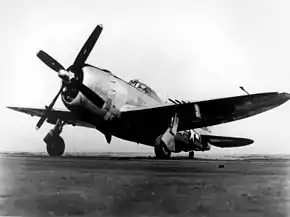537th Airlift Squadron
The 537th Airlift Squadron is an inactive squadron of the United States Air Force. The unit was last active at Joint Base Elmendorf-Richardson Alaska, where it was inactivated on 13 September 2013.
537th Airlift Squadron
 | |
|---|---|
 C-130 Hercules aircraft of the 537th Airlift Squadron on an airdrop training mission near Joint Base Elmendorf-Richardson | |
| Active | 1943–1944; 1952–1953; 1966–1971; 2011–2013 |
| Country | United States |
| Branch | |
| Role | Airlift |
| Part of | Pacific Air Forces |
| Motto(s) | Gesta non-Verba Latin: Deeds, not Words |
| Decorations | Presidential Unit Citation Air Force Outstanding Unit Award Republic of Vietnam Gallantry Cross with Palm |
| Insignia | |
| 537th Airlift Squadron emblem (approved 26 March 1968)[1] |  |
The squadron was first established during World War II as the 537th Fighter Squadron. It served as a Replacement Training Unit for Republic P-47 Thunderbolt pilots until it was disbanded in a major reorganization of the Army Air Forces in 1944 designed to streamline training organizations.
In 1952, the squadron was redesignated as the 537th Troop Carrier Squadron, and activated at Atterbury Air Force Base to replace elements of the 923d Reserve Training Wing. The following year the squadron was inactivated and replaced at Atterbury by the 73d Troop Carrier Squadron.
The unit was activated again in Viet Nam as a C-7 Caribou squadron assigned to the 483d Tactical Airlift Wing the squadron was awarded three Presidential Unit Citations for its actions during the Viet Nam War.
In 2011, the unit was re-activated and designated the 537th Airlift Squadron.
History
World War II

The squadron was first established as the 537th Fighter Squadron and was activated in November 1943 at Richmond Army Air Base, Virginia,[2] as one of the four original squadrons of the 87th Fighter Group.[3] The squadron began operations with Republic P-47 Thunderbolts as a Replacement Training Unit (RTU). RTUs were oversized units which trained aircrews prior to their deployment to combat theaters and assignment to an operational group.[4] In January 1944, the squadron and the 546th Fighter Squadron moved to Millville Army Air Field, New Jersey,[2] and the 87th group's headquarters and other squadrons transferred to Camp Springs Army Air Field, Maryland.[3][5]
However, the Army Air Forces found that standard military units, based on relatively inflexible tables of organization were proving less well adapted to the training mission. Accordingly, a more functional system was adopted in which each base was organized into a separate numbered unit.[6] while the groups and squadrons acting as RTUs were disbanded or inactivated.[7] This resulted in the squadron being disbanded in the spring of 1944[2] and being replaced by the 135th AAF Base Unit (Fighter), which assumed its mission, personnel, and equipment.[8]
Air Force Reserves
In 1952 the squadron was redesignated as the 537th Troop Carrier Squadron, became part of the newly constituted 87th Troop Carrier Wing under the wing base organization system, and was activated at Atterbury Air Force Base. The 87th Wing replaced the 923d Reserve Training Wing at Atterbury when reserve flying operations resumed there.[note 1] The squadron operated Curtiss C-46 Commandos to train reservists. In February 1953 the 434th Troop Carrier Group was released from active duty and activated in the reserves, and its 73d Troop Carrier Squadron assumed the mission, personnel and equipment of the 537th.[9]
Vietnam War
_is_fueled_at_Pleiku_Air_Base%252C_Vietnam%252C_in_April_1970_(176246882).jpg.webp)
The squadron was activated in 1967, and took over DeHavilland Canada C-7A Caribou aircraft that were formerly operated by the 17th Aviation Company of the U.S. Army in South Vietnam, adopting the tactical airlift mission. The squadron initially maintained a detachment at An Khe, which had been the 17th's base. It operated from Phù Cát Air Base. The 537th earned a Navy Presidential Unit Citation, as well as an Air Force Presidential Unit Citation for airlift support of Khe Sanh and other forward bases from January to May 1968. It earned a second Air Force Presidential Unit Citation for action between April and June 1970[1] when it participated in the aerial resupply of Dak Seang Special Forces Camp, evacuation of over 2000 refugees from Cambodia, and transportation of the Presidential Southeast Asia Investigation Team to various remote locations in South Vietnam.
Alaska
The squadron was redesignated as the 537th Airlift Squadron and activated at Joint Base Elmendorf-Richardson, Alaska in 2011 to augment the 144th Airlift Squadron of the Alaska Air National Guard. Its primary mission was to support Army airborne forces training. The squadron was inactivated due to cuts in the Department of Defense budget resulting from sequestration.[10]
Lineage
- Constituted as the 537th Fighter Squadron (Single Engine) on 24 September 1943
- Activated on 1 October 1943
- Disbanded on 10 April 1944
- Reconstituted and redesignated 537th Troop Carrier Squadron (Medium) on 26 May 1952
- Activated in the reserve on 15 June 1952
- Inactivated on 1 February 1953
- Redesignated 537th Troop Carrier Squadron and activated on 12 October 1966 (not organized)
- Organized on 1 January 1967
- Redesignated 537th Tactical Airlift Squadron on 1 August 1967
- Inactivated on 31 August 1971
- Redesignated 537th Airlift Squadron on 30 March 2011
- Activated on 29 April 2011[11]
- Inactivated on 11 September 2013
Assignments
- 87th Fighter Group: 1 October 1943 – 10 April 1944
- 87th Troop Carrier Group: 15 June 1952 – 1 February 1953
- Pacific Air Forces: 12 October 1966 (not organized)
- 483d Troop Carrier Wing (later 483d Tactical Airlift Wing): 1 January 1967 – 31 August 1971
- 3d Operations Group: 29 April 2011 – 11 September 2013[11]
Stations
- Richmond Army Air Base, Virginia, 1 October 1943
- Millville Army Air Field, New Jersey, 7 January 1944 – 10 April 1944
- Atterbury Air Force Base, Indiana, 15 June 1952 – 1 February 1953
- Phu Cat Air Base, Vietnam, 1 January 1967 – 31 August 1971
- Joint Base Elmendorf-Richardson, Alaska, 29 April 2011 – 11 September 2013[11]
Commanders
Capt John C. Yancey, 6 October 1943 – 10 April 1944; Lt Col Charles C. Smith, 1 January 1967; Lt Col John F. Yelton, c. Apr 1967; Lt Col Harold J. Zweifel, 22 May 1967; Lt Col Robert C. Olson, c. Jul 1967; Lt Col Gayle C. Wolf, 1 May 1968; Lt Col George C. Marvin, 18 February 1969; Lt Col Donald J. MacFarren, 14 November 1969; Lt Col Walter H. Perris, c. Jun 1970; Lt Col Ray Barton, 16 November 1979 – c. Aug 1971[11][12]
Aircraft
- Republic P-47 Thunderbolt, 1943–1944
- Curtiss C-46 Commando, 1952–1953
- DeHavilland Canada C-7A Caribou, 1967–1971
- Lockheed Martin C-130H Hercules, 2011–2013[11]
Awards and Campaigns
| Award streamer | Award | Dates | Notes |
|---|---|---|---|
| Presidential Unit Citation | 21 January 1968 – 12 May 1968 | 537th Tactical Airlift Squadron, Viet Nam[1] | |
| Presidential Unit Citation | 1 April 1970 – 30 June 1970 | 537th Tactical Airlift Squadron, Viet Nam[1] | |
| Navy Presidential Unit Citation | 20 January 1968 – 1 April 1968 | 537th Tactical Airlift Squadron, Viet Nam[1] | |
| Air Force Outstanding Unit Award w/Combat "V" Device | 1 January 1967 – 30 April 1967 | 537th Troop Carrier Squadron[1] | |
| Air Force Outstanding Unit Award w/Combat "V" Device | 1 May 1967 – 30 April 1968 | 537th Troop Carrier Squadron (later Tactical Airlift Squadron)[1] | |
| Air Force Outstanding Unit Award w/Combat "V" Device | 1 July 1970 – 28 August 1971 | 537th Tactical Airlift Squadron[1] | |
| Vietnamese Gallantry Cross with Palm | 1 January 1967 – 31 August 1971 | 537th Troop Carrier Squadron (later Tactical Airlift Squadron)[1] |
| Campaign Streamer | Campaign | Dates | Notes |
|---|---|---|---|
| Vietnam Air Offensive | 1 January 1967 – 8 March 1967 | 537th Troop Carrier Squadron[1] | |
| Vietnam Air Offensive, Phase II | 9 March 1967 – 31 March 1968 | 537th Troop Carrier Squadron (later Tactical Airlift Squadron)[1] | |
| Vietnam Air/Ground | 22 January 1968 – 7 July 1968 | 537th Tactical Airlift Carrier Squadron[1] | |
| Vietnam Air Offensive, Phase III | 1 April 1968 – 31 October 1968 | 537th Tactical Airlift Carrier Squadron[1] | |
| Vietnam Air Offensive, Phase IV | 1 November 1968 – 22 February 1969 | 537th Tactical Airlift Carrier Squadron[1] | |
| Tet 1969/Counteroffensive | 23 February 1969 – 8 June 1969 | 537th Tactical Airlift Carrier Squadron[1] | |
| Vietnam Summer-Fall 1969 | 9 June 1969 – 31 October 1969 | 537th Tactical Airlift Carrier Squadron[1] | |
| Vietnam Winter-Spring 1970 | 3 November 1969 – 30 April 1970 | 537th Tactical Airlift Carrier Squadron[1] | |
| Sanctuary Counteroffensive | 1 May 1970 – 30 June 1970 | 537th Tactical Airlift Carrier Squadron[1] | |
| Southwest Monsoon | 1 July 1970 – 30 November 1970 | 537th Tactical Airlift Carrier Squadron[1] | |
| Commando Hunt V | 1 December 1970 – 14 May 1971 | 537th Tactical Airlift Carrier Squadron[1] | |
| Commando Hunt VI | 15 May 1971 – 31 July 1971 | 537th Tactical Airlift Carrier Squadron[1] |
References
Notes
- Explanatory notes
- The 923d had been activated in 1951 when the reserve 434th Troop Carrier Wing was called to active duty for the Korean War.
- Citations
- Robertson, Patsy (22 August 2011). "Factsheet 537 Airlift Squadron (PACAF)". Air Force Historical Research Agency. Archived from the original on 3 March 2013. Retrieved 20 December 2013.
- Maurer, Combat Squadrons, p. 644
- Maurer, Combat Units, pp. 153–154
- Craven & Cate, Introduction, p. xxxvi
- Maurer, Combat Squadrons, pp. 643–644
- Goss, p. 75
- Maurer, Combat Units, p. 7
- See "Abstract, History of Millville AAF 1940–1944". Air Force History Index. Retrieved 16 December 2013.
- Ravenstein, p. 122
- Ramsoeur, A1C Tammia (17 September 2013). "537th Airlift Squadron inactivates". Joint Base Elmendorf Richardson Public Affairs. Archived from the original on 21 December 2013. Retrieved 1 November 2018.
- Lineage, including assignments, stations, commanders, aircraft through 2011 in Robertson.
- unknown 1–5 October 1943, 15 June 1952 – 1 February 1953
Bibliography
![]() This article incorporates public domain material from the Air Force Historical Research Agency.
This article incorporates public domain material from the Air Force Historical Research Agency.
- Craven, Wesley F; Cate, James L, eds. (1955). The Army Air Forces in World War II. Vol. VI, Men & Planes. Chicago, Illinois: University of Chicago Press. LCCN 48003657.
- Goss, William A. (1955). "The Organization and its Responsibilities, Chapter 2 The AAF". In Craven, Wesley F.; Cate, James L. (eds.). The Army Air Forces in World War II (PDF). Vol. VI, Men & Planes. Chicago, IL: University of Chicago Press. LCCN 48003657. OCLC 704158. Retrieved 17 December 2016.
- Maurer, Maurer, ed. (1983) [1961]. Air Force Combat Units of World War II (PDF) (reprint ed.). Washington, DC: Office of Air Force History. ISBN 0-912799-02-1. LCCN 61060979.
- Maurer, Maurer, ed. (1982) [1969]. Combat Squadrons of the Air Force, World War II (PDF) (reprint ed.). Washington, DC: Office of Air Force History. ISBN 0-405-12194-6. LCCN 70605402. OCLC 72556.
- Ravenstein, Charles A. (1984). Air Force Combat Wings, Lineage & Honors Histories 1947–1977. Washington, DC: Office of Air Force History. ISBN 0-912799-12-9.
External links
- C-7 Caribou Association – 537th Tactical Airlift Squadron Retrieved 20 December 2013
- Forgett, John F., 12 Tactical Fighter Wing Association: Phu Cat Air Base History Retrieved 20 December 2013
- PACAF news story 537th Airlift Squadron flies again after 40 years Retrieved 20 December 2013
- Air Force Magazine New C-130 Squadron in Alaska Retrieved 20 December 2013
- YouTube video 537th Airlift Squadron Final Flight Retrieved 20 December 2013